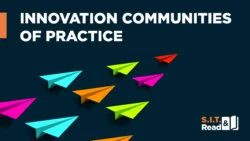If you are here, it probably means that I’ve convinced you that you should engage with the idea of establishing your Innovation Community of Practice. Part 2 (click for part 1) of our series highlights “top innovation coaches”, their importance in having an active, impactful innovation community of practice, and the way they become key assets in the innovation community over time.
It is not about taking a course; it is about implementing new skills
(almost) Everyone loves to attend training events and courses. Assuming you have a good trainer, you should have a good time. However, an impactful program is not (only) about taking a-training, it is more about getting things done the day after. Conducting a 2/3/5/10-day training is necessary and an important beginning, but it is not enough. It doesn’t cut it. From an organizational perspective, as well as from a personal one, individuals must implement what they learned to generate growth and impact. In other words – innovation training programs, like innovation projects, must integrate an implementation phase, otherwise – it is just an exercise we once engaged in, maybe even a good learning memory.
With everything I know about training, learning, innovation (and some other things), this criteria was very clear to me when I stepped into leading my first innovation training program 7 years ago. It was obvious that I needed to provide more than “just” new knowledge. In fact, the strength of our programs – then and now – depends on engagement, especially in the post-training phase – where we get to see what participants do (or will not do) once our team is not there 24/7 to train and mentor.
Over time, I started to notice a pattern – when you take a group of smart, talented, capable individuals, and train them to do something useful – they will all take something from the training to their professional (and personal) lives. Yet only some of them will do that in a way that brings true impact to the innovation community, to the organization (and to their career), and bring new ROI to the innovation network. Those are our top innovation coaches, the top runners.
Meet the top runners, your network’s true X-factor
All iCoaches need to be active, promoting innovation buzz, engagement, new ideas, and small-scale initiatives. We know that they all do it in different ways, and over time – some get more active, and some – less. This is the nature of group behavior and normal statistics, and yet another important reason to consider onboarding your innovation coaches over time, using a cohort system.
Granted that top coaches are active coaches, but to be a true top runner you need something extra – which makes you a key asset to the innovation community. In other words, top runners are active in a way that highlights constant engagement, as well as a strong desire to drive business impact. They are not necessarily the ones who run the most mini-sessions or know all the tools and methodologies, yet they are the ones who bring the most added value to the innovation effort as a whole; they are the ones whom you cannot imagine your community without. It is no wonder that over time the strength of this sub-group – as individuals and as a team – will determine the strength of your innovation community.
What is this X-factor? One of those things that may be a bit difficult to explain in one sentence. It is a unique combination of skills and attributes who differentiates them from others, making sure that they will do something very useful with their learning, and by doing so – become important members in the innovation community. In some cases, top coaches are simple to spot, in others – not as much. To find these candidates, one should try looking for the ones whom you cannot imagine your network without, and the ones whom you always reach out first with every new idea, initiative or challenge, or when you need to think with someone you trust. These are your top runners.
Each innovation community is different, and so are top runners, yet they all share similar aspects and characteristics. After training hundreds of coaches, exploring their activities, what helps them to succeed, and what prohibits their efforts, let’s meet our top runners:
- Ben the Connector. Ben knows everyone in the organization, making him the network’s matchmaker – bringing together people, topics, and resources. He takes the time to connect, introduce, and to be introduced in all key teams and functions in the organization, knowing what they are up to, and connecting them to a relevant fellow iCoach to lead a mini-session around a specific topic identified. Ben also takes the time to make sure that topic owners and coaches are connected over time, helping them to follow up with results and ongoing innovation opportunities.
- Problem Solver Michael. Mike’s idea of a good day is a day in which a complicated problem was solved, preferably one that others were not able to fully grasp. Mike will always find all the time in the world to explore topics and challenges using different tools and methodologies, as well as his endless curiosity to find out different tracks and tools. People often reach out to him with a topic that others gave up on or are not sure how to address; from time to time, he will even present one of those topics to the iCoaches community, to inspire them to provide him and others with more problems to solve.
- Together Tammie. With some time passed since her training, Tammie became all iCoaches best wing-person for every session or activity, making her one of the network’s most active and knowledgeable coaches. Her engagement, experience, and familiarity with all iCoaches makes Tammie a key resource in many exciting initiatives, providing her with a rich pull of success stories and examples as well as an opportunity to make sure coaches meet from time to time – in small groups or as a full team.
- “Let’s go for it” Ellen. Ellen has no fear in leading sessions, meetings, pith, or town-hall meetings designed to showcase the network’s progress and business contribution. Ellen has top moderation skills, continually improving as she seeks additional opportunities to engage with teams, topics, and events. It is no wonder that over time Ellen became an important resource in supporting difficult sessions, as well as promoting the network’s overall wow effect.
- Melissa’s Management. Melissa masters innovation and organizational skills, to perfectly echo her key role in the organization and manager’s support. This unique combination makes Ellen the best person to engage with senior management and stakeholders when asking for new resources for projects and events, training opportunities for iCoaches and adjacent teams, and dealing with political problems in general. Melissa works closely with the community’s senior sponsor and is considered as one of the architects, responsible for the network’s success.
Top runners are presented here as Personas, these are not real people. Yet, I am confident that some of you will see yourselves in one of those team members, or maybe as a combination of two. Learning what makes an iCoach a top runner is useful for coaches who wish to advance, contribute, and understand how they can add value to their network; and for community leaders – when looking into improving their team’s performance as well as in the nomination phase of new coaches to be.
And what about other iCoaches? Most coaches’ networks, like most groups in general, exhibit a standard spread of motivations, skills, interests, and circumstances. It is very difficult, not to say – unlikely, to have a group in which every iCoach is a top runner. Having said that, some networks – and their senior managers, have been doing better than others in nominating, training, and mentoring their networks – improving their ratio and network strength.
Want to become more like Ellen, Michael or Melissa and master their skills and capabilities? Want to make sure you identify and nurture your top talents? Comment below or write to us directly.
While finalizing this article I was toying with the possibility of designing an innovation community in which every iCoach is a top runner. Not sure if this idea can indeed become a live innovation community of practice, but the more we highlight iCoaches’ nomination process, post-training mentoring and organizational buy-in, the closer we get. What do you think? Could you imagine this dream team in your organization?


